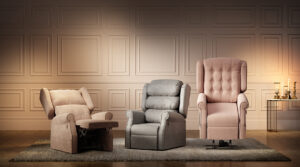
Joint pain reducing your independence? Consider a riser recliner, suggests Debra Dunitz, Consultant Occupational Therapist
 Riser recliners can be an important part of maintaining independence in my extensive experience of working with people with stiff and painful joints.
Riser recliners can be an important part of maintaining independence in my extensive experience of working with people with stiff and painful joints.
There are many benefits of riser recliners which help keep you independent:
Reduce joint pain
For people with joint pain as a result of arthritis, fibromyalgia or many other health conditions, the riser function of a riser recliner chair can reduce the pressure on the joints as you stand down and sit up. The powered back rest recline and tilt in space functions also enable you to passively reposition and stretch out lower limb joints, reducing the likely stress and pain whilst still benefitting from frequently repositioning to maintain range of movement.
Support physiological functions
A well supported seated position doesn’t just enhance comfort and enable you to carry out tasks that are important to you, it also promotes good circulation, digestion and respiration. A prime seating goal is that the backrest, headrest, arm rests, seat base and floor are used effectively to support the body and enable a good, upright position. Having the body in an upright position reduces interruption to these essential physiological functions. This can only be achieved if the chair is the correct size.
Increase independence
With some neurological conditions such as multiple sclerosis, Parkinson’s and motor neurone disease, the right chair can have significant benefits. A chair which is the correct size, with the right support and mechanisms, can significantly increase a person’s independence and functional levels by enabling them to sit and stand with minimal strain and maintain a well supported position when seated. When a person is properly supported, they have more freedom to use their arms to carry out important tasks including eating and drinking as well as activities such as working on a computer to doing the crossword.
Adapt with the body

Debra Dunitz, Consultant Occupational Therapist. Since qualifying in 2006, Debra has worked as an occupational therapist in community and in-patient environments.
Unfortunately, many neurological conditions are progressive which means that over time the ability to carry out many tasks may become more difficult due to the effects of the condition on the body. When we consider the impact of the deterioration on how we sit, we know that tasks such as standing up, sitting upright and being comfortable can all be greatly affected, and the amount of support required from the chair is likely to increase.
For example, I’ve worked with Farborg for two years and know that their riser recliner chairs are available in a range of bespoke fabrics and can be manufactured to your exact dimensions to ensure you have a comfortable chair for years to come.
For further information about Farborg visit their website or tel 01223 857 800.
